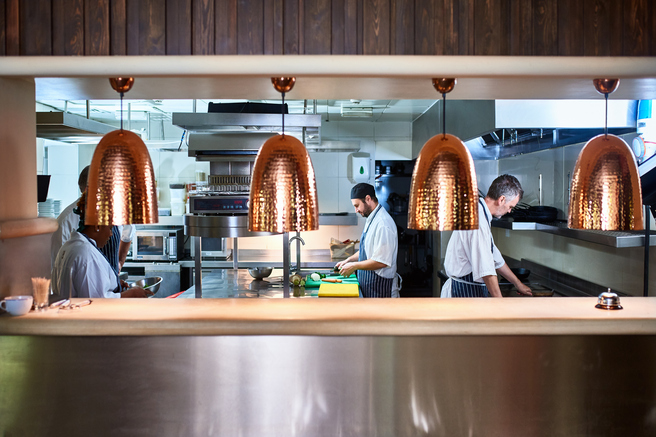What are the best paying restaurant jobs?

More than 12.5 million people work in the restaurant industry in the US, but many are in entry-level roles such as food runner or prep cooks, meaning the national average salary in the restaurant industry is less than $40,000 per year. But have you ever wondered if a restaurant career can mean big bucks? While some might picture late nights and endless refills, the truth is the restaurant industry offers a surprising range of high-paying opportunities.
So, whether you're a people person who thrives in a fast-paced environment or a culinary mastermind with a passion for creating incredible dishes, there's a restaurant job out there that can fuel your bank account along with your ambitions. Dig in as we explore the highest-paying restaurant jobs and how you can land one of these exciting roles.
Top high-paying restaurant jobs
The restaurant industry has a fascinating range of career paths, each with its own unique challenges and rewards. But for those seeking top dollar, several positions stand out. Let's look at some high-paying restaurant jobs out there
General manager
Overseeing every aspect of a restaurant's operation, from financial management and staffing decisions to crafting the menu and ensuring a delightful guest experience, a general manager’s leadership sets the tone for the entire team. Success hinges on their ability to wear multiple hats – a strategic thinker, a financial whiz, a motivational leader and a champion of exceptional hospitality. Restaurant managers command an average annual salary of $58,594, though this varies a lot between different restaurants.
Executive chef
More than just a master of the kitchen, the executive or head chef is the heart and soul of the culinary experience. They invent dishes and craft innovative menus that tantalize taste buds. They also lead and mentor a team of talented cooks and chefs, ensuring the highest quality standards are always met. Beyond culinary expertise, strong leadership skills and the ability to manage a fast-paced environment are vital for success. Executive chefs can earn around $95,302 per year.
Sommelier
For those with a passion for wine, this is a dream role. Sommeliers curate a wine list that complements the restaurant’s cuisine, acting as a knowledgeable guide for diners seeking perfect pairings. They also pick wine for set menus. Negotiating with distributors and staying abreast of industry trends are also key aspects of the job. A sommelier's deep understanding of wine heightens the dining experience for guests, transforming a meal into a memorable journey. Their average salary is $63,788 per year.
Restaurant owner
For those with an entrepreneurial spirit, restaurant ownership can pose an exciting challenge. The rewards are significant; the satisfaction of building a successful business from the ground up, shaping a unique brand identity and cultivating a loyal customer base. However, restaurant owners shoulder immense responsibility for financial matters, marketing strategy and staff well-being. It’s hard to know how much owners can make, as the earnings are highly dependent on the type of restaurant and the success of the business, but the average salary is $59,587.
Pastry chef & executive pastry chef
The artists behind the delectable pastries and cakes that grace the dessert menu. Their creativity is legendary, crafting visually stunning and flavor-packed treats that keep customers coming back for more. The executive pastry chef leads the team, ensuring consistent quality and innovation across the entire dessert selection. An eye for detail, a passion for flavor combinations and a touch of artistry are essential qualities for these sweet specialists. On average, a pastry chef earns $67,303 a year.
Kitchen manager & culinary director
Behind the scenes and playing a critical role in ensuring smooth daily operations. Kitchen managers handle staff scheduling, maintain rigorous quality control standards and oversee food preparation to guarantee a seamless workflow. The culinary director, often found in larger restaurant groups, takes a more strategic perspective. They lead menu development efforts, promote culinary innovation and ensure consistency across multiple locations. Kitchen managers earn an average of $61,094, while culinary directors make $108,928 annually.
Director of restaurant operations
For those with a keen eye for detail and a talent for streamlining processes, this is an ideal role. They oversee the seamless functionality of an entire restaurant or group of restaurants. This includes financial management, data analysis and implementing strategies to maximize profitability. Key attributes are a focus on efficiency, a strong understanding of restaurant operations and the ability to identify and capitalize on growth opportunities. The director of restaurant operations can earn around $102,175 a year.
Research chef
At the cutting edge of the industry are those who push culinary boundaries. Research chefs explore innovative ingredients and dishes, keeping menus fresh and exciting. As a specific role, fermentation engineers look into the science of fermenting food, creating unique flavor profiles and exploring new techniques. Food scientists also look at new ways to cook and present food. All these roles demand a passion for experimentation, a scientific mind and a deep curiosity about the ever-evolving world of food. Research and development chefs earn an average annual salary of $83,595.

Other factors that affect restaurant salary
While the specific job role plays a major role in restaurant salaries, several other factors can influence your earning potential. Salaries can vary based on:
-
Restaurant type: upscale restaurants typically offer higher salaries than a casual restaurant can. This reflects the increased skill and experience required as well as the higher average bill
-
Location: major cities with a high cost of living may offer higher wages to attract and retain talent
-
Restaurant experience: the more expertise you have, the higher your salary is likely to be. This applies not just to chefs, but also to seasoned servers, bartenders and restaurant managers
-
Tips: this can vary depending on the restaurant's tipping culture and average customer spending
-
Benefits: some restaurants offer a comprehensive package, including health insurance, paid time off and retirement contributions
-
Company performance: restaurants that are performing well financially are more likely to offer competitive salaries and benefits. Conversely, struggling establishments may have limited resources for employee compensation
Navigating career progression in the restaurant industry
There is plenty of potential to climb from entry-level positions such as busser or server to leadership roles such as executive chef or general manager. The journey requires dedication, continuous learning and a strategic approach. Some key tips to help you navigate your climb are:
-
Master the fundamentals: learn the ins and outs of your current role, whether it's tableside service or food prep procedures in the kitchen. A solid grasp of the basics demonstrates your commitment and prepares you for future responsibilities
-
Embrace continuous learning: stay ahead of the curve by actively seeking learning opportunities. Take advantage of in-house training programs, attend industry workshops or pursue online courses related to your desired career path
-
Network within the industry: building strong relationships can open doors. Aim to connect with colleagues, chefs, managers and industry professionals at events or conferences and mentors who can provide guidance and support your career aspirations
-
Seek opportunities for growth: don't be afraid to step outside your comfort zone. Volunteer for additional responsibilities, express interest in training opportunities and show your willingness to learn about new areas of the business
-
Move up or move on: if advancement opportunities are limited at your current workplace, consider exploring positions at other restaurants, especially those with established career ladders
Crucial steps to landing high-paying jobs in restaurants
If you are aiming for the highest roles in the culinary service industry, there are several ways you can get ahead. Let's explore the top tips to help you reach your goals.
Educational paths
A culinary degree provides a comprehensive curriculum that equips you with a solid foundation for high-level roles in a professional kitchen. Culinary schools often incorporate courses in food science, menu planning, restaurant management and even business essentials. This helps you develop a well-rounded skillset valuable in various restaurant settings. Culinary school also encourages a community of like-minded individuals who are passionate about food. Building connections with classmates and instructors can open doors to future job opportunities and industry mentorships. Many culinary schools offer dedicated career services departments and valuable internship opportunities for you to gain real-world experience.
Breaking into exclusive roles
Specialized roles such as research chef or sommelier demand dedication and a focused approach to your development. These positions require a deeper understanding and more expertise compared to more traditional restaurant careers. Beyond certifications, make the most of apprenticeship opportunities and internships. These provide invaluable mentorship that allows you to learn from experienced professionals, refine your palate through guided tastings and gain insights into the intricacies of your chosen role. Networking is also vital. Attend industry events, conferences and workshops to connect with other professionals. These interactions will broaden your knowledge base, showcase your passion and potentially open doors to future career opportunities.
Top skills to succeed in the restaurant industry
The hectic environment of a restaurant demands a unique blend of skills, especially in the top roles. The main qualities that will set you apart in the restaurant industry include:
-
Culinary skills: the chef skills needed include cooking, knifework, flavor awareness and health protocols as well as how to use high-tech kitchen equipment
-
Communication: the ability to clearly convey information to colleagues and guests is essential. This includes active listening, articulation and tailoring your communication style to different personalities
-
Teamwork: being a reliable team player, building a positive work environment and offering support to colleagues are key aspects of working in a restaurant
-
Time management: restaurant life is about juggling multiple tasks simultaneously, working efficiently under pressure and meeting deadlines consistently
-
Problem solving: unexpected situations are inevitable in the restaurant business. The ability to think critically, identify solutions and adapt to changing circumstances is a valuable asset
-
Work ethic: being reliable, showing initiative and demonstrating a willingness to go the extra mile to ensure smooth operation and a positive customer experience
-
Customer service: the ability to anticipate guests' needs, deliver friendly and attentive service and handle complaints professionally creates a memorable dining experience and keeps customers coming back for more
-
Attention to detail: from plating a dish to ensuring a clean and well-maintained environment, a keen eye for detail is important. This ensures consistency, quality and a professional presentation that reflects well on the restaurant
Conclusion: charting your course to restaurant success
The world of restaurants offers a great blend of culinary artistry, fast-paced action and the satisfaction of creating memorable dining experiences. Whether you're drawn to the leadership challenges of a general manager role, the creative freedom of an executive chef or the innovative world of culinary research, there's a high-paying restaurant career path waiting for the passionate and dedicated.
Remember, the key to success lies in a combination of factors – honing your skill set, pursuing continuous learning and networking. With dedication, strategic planning and a dash of perseverance, you can transform your restaurant career aspirations into a rewarding reality. A great place to start is to build the skills you need by getting a culinary degree from a renowned school such as Ecole Ducasse.


